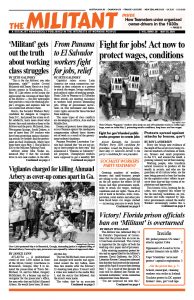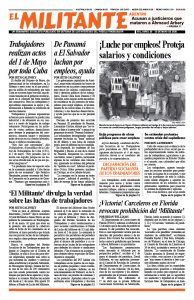Residents of several towns and villages in Idlib province in Syria organized protests April 30 against Hay’at Tahrir al-Sham (HTS), the former al-Qaeda affiliate that controls the area. They demanded that the reactionary sect’s forces halt moves to reopen to commercial traffic the borders between Idlib and territory held by the country’s dictatorial Bashar al-Assad regime.
Idlib is the only area of the country west of the Euphrates River that Assad and his allies in Moscow and Tehran have been unable to recapture during Syria’s civil war.
HTS took control over Idlib last year at the expense of other opponents of Assad that were backed by the Turkish government. The group has used its control of provincial border crossings to impose taxes and enrich its coffers.
Protesters told the Iraqi Kurdish news agency Rudaw that they strongly oppose HTS normalizing border relations with Assad. His regime brutally suppressed a popular uprising for political rights in 2011 that led to a civil war, uprooting or killing millions of people.
During that conflict rebel groups forced Assad to retreat. But his forces were reinforced by Tehran-backed militias and from 2015 by Moscow’s air power. Assad and the Russian military have repeatedly sent bombers to conduct airstrikes in Idlib.
Hundreds of thousands of Syrians have returned to their homes in Idlib since Moscow signed a cease-fire March 5 with the Turkish government, another of the powers intervening in Syria’s civil war for its own ends. Assad’s forces regularly breach the agreement by firing at refugees returning home.
The week before the current round of actions, dozens of Syrians returning to Idlib protested at a border crossing, demanding HTS abolish the exorbitant tolls they charge.
“We have to pay more than 100,000 Syrian pounds [$195],” Salwa Mahmoud said to Al-Monitor. She was trying to get back home with her three children after fleeing to live in a tent in the Aleppo countryside to escape Assad’s bombing. The rulers in Turkey have closed their border to refugees from Idlib.
“Sitting here under the bombing is better than being displaced in the camps and not having a home,” Zakaria Shawish told the Daily Sabah.
Protests in Idlib had been organized earlier against both HTS arrests of members of opponent rebel groups and the Assad regime’s bombings.
Over half of the 3 million people living in Idlib had been forced to flee other parts of Syria after Assad’s forces carpet-bombed and seized their homes.
Assad now also faces a deepening economic crisis and a splintering of his regime from within. Under pressure from Moscow to cover the cost of its military support, Assad began seizing the businesses of Rami Makhlouf, his cousin and Syria’s richest person. Assad placed Makhlouf, who had been a crucial financial backer of his regime, under house arrest. Makhlouf has publicly challenged Assad’s attacks on his fortune and other family members have spoken out in his support.

